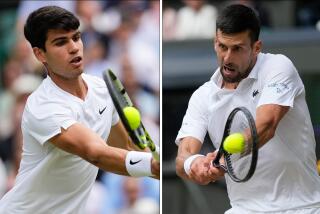Evert Returns to Her Grass Roots for Win : Comeback Against Golarsa Is One for the Ages; Graf Beats Sanchez Vicario to Gain Semifinals
- Share via
WIMBLEDON — It was broad daylight, but the sun was ready to set on Chris Evert, one of the breathing icons of women’s tennis who seemed to be down to her last blade of grass.
In her 18th and probably last Wimbledon, she was in the process of losing to someone who was 3 years old the first time Evert had set foot here.
She trailed, 5-2, in the third set to Laura Golarsa, 21, of Italy. But soon, something remarkable happened.
Suddenly, Evert was not 34 anymore. She raced into the corner of the court and sent a backhand passing shot down the line.
The ball landed within the shadow of the baseline.
With such a shot reputations are validated and careers just keep going. Evert needed that shot to set up break point at 3-5 in the third set, which she converted on her way to the Wimbledon semifinals.
Once only two points away from losing, Evert won the last five games in the fifth set to score a 6-3, 2-6, 7-5 victory over Golarsa, who recognized immediately what had happened to her.
“That’s why she’s Chris Evert Lloyd . . . I mean Chris Evert,” Golarsa said.
Maybe Steffi Graf won’t allow Evert the chance to come back like that in their semifinal Thursday, and although Evert did so against a player ranked No. 82, her moment against Golarsa was not without magic.
Even Evert thought so.
For at least one afternoon, Wimbledon was hers, maybe one last time.
“In the third set, I was thinking, certainly . . . if it would be my last year, which probably it would be, it would not be the way to go out,” she said.
“I remember that one point was crucial because it was a running backhand. It was such an accurate shot . . . the biggest shot in the third set, the biggest point in the match.”
Golarsa, a serve-and-volley specialist from Milan, had used her game to catch Evert flat-footed with a series of accurate volleys. She won 10 of 11 games in the second and third sets.
But after she held serve for 5-2 in the third set, Golarsa would not win another. The Evert backhand turned the match, Golarsa said.
“She was on the outside of the court, she just crossed the court and she play on the line the backhand--not many players can play this shot in this moment,” Golarsa said.
There have been few in the recent years of women’s tennis who have played shots like Graf and Martina Navratilova, who joined Evert as quarterfinal winners on a warm, sunny Tuesday afternoon.
Graf earned a measure of revenge against the player who defeated her in the French Open final with a convincing, 7-5, 6-1, victory over Arantxa Sanchez Vicario of Spain.
Navratilova, eight times a Wimbledon champion, moved into the semifinals against Catarina Lindqvist with a margin of victory even clearer than Graf’s, a 6-1, 6-2 romp over Gretchen Magers of San Diego.
Lindqvist overcame a shaky serve and became Wimbledon’s first Swedish women’s semifinalist after she beat Rosalyn Fairbank of South Africa, 7-5, 7-5.
Graf admitted she wanted to send a message to Sanchez Vicario.
“It was not revenge, but I was trying to play better,” she said. “I wanted to play against her and I wanted to play better.”
So Graf accomplished both. Sanchez Vicario, who thrives on confidence, lost hers when she was serving for the first set at 5-4.
Graf won the first two points and then hit a forehand that appeared to land just beyond the baseline, but it wasn’t called out and Sanchez Vicario double faulted at break point.
She won only one more game, but that call on the baseline bothered her.
“I really couldn’t do anything and the point is for Steffi Graf, but I really think they really called it very late,” Sanchez Vicario said.
It is once again a confident Graf who will play Evert in the semifinals.
Graf said she is simply herself again, which is bad news for anyone in her way.
“I am playing normal right now,” she said. “I just didn’t play well enough to win the French Open. This match, for example, was nothing special. It depends on me.”
Since 1982, Navratilova has lost only one match at Wimbledon--to Graf in last year’s final--and her record here in that period is 54-1. Magers, who lives on a sailboat with her husband in San Diego, seemed to sink under the weight of Navratilova’s experience.
“I figure I had the edge there,” Navratilova said. “The experience counts for something. It’s probably the first time (Magers) ever curtsied, anyway.”
Lindqvist, 26, reached the quarterfinals at Wimbledon in 1986, but she has now gone where no Swedish woman has ever been before. She is there it spite of her serve.
Twice Lindqvist lost her serve when serving for the set at 5-4, but she still won both sets and the chance to try to upset Navratilova.
“I’m going to go in and think I have a chance to win,” Lindqvist said.
Evert thought her chance had passed.
“I certainly never thought I was going to win the match,” she said. “I still remember the 30-30 point when I hit that backhand down the line.”
So flustered was Golarsa that she won only five points in the last three games.
Evert held to 5-5 after deuce when Golarsa sailed a backhand lob long, broke Golarsa at 6-5 30-40 with a forehand passing shot deep in the corner and served out the match at love.
Evert’s punctuation mark was a forehand winner at match point.
The exclamation point?
“I was pretty lucky to win the match,” Evert said. “I was wondering if I had that reserve. I was wondering in the third set because I pulled so many matches out in my career. Or was there nothing there?
“Thank heavens for me there is still something there.”
More to Read
Go beyond the scoreboard
Get the latest on L.A.'s teams in the daily Sports Report newsletter.
You may occasionally receive promotional content from the Los Angeles Times.










